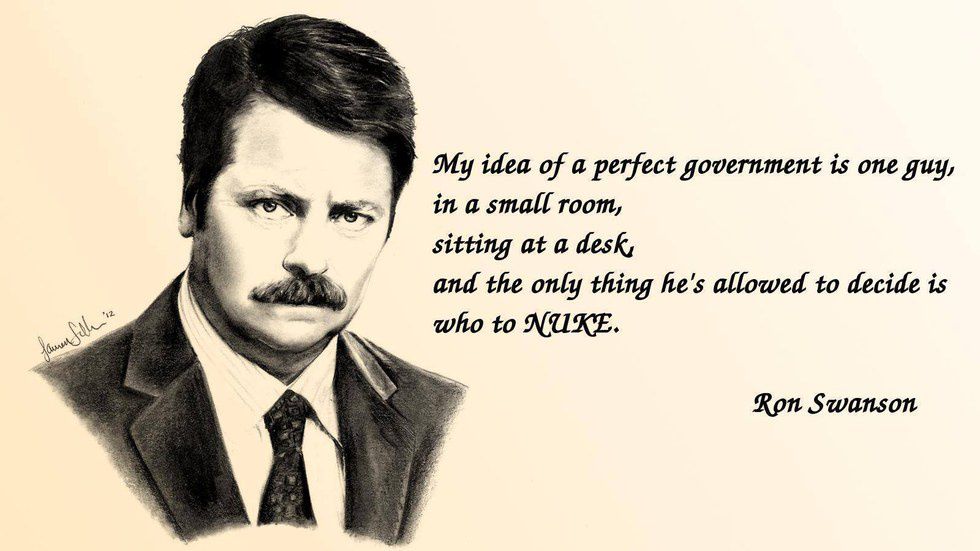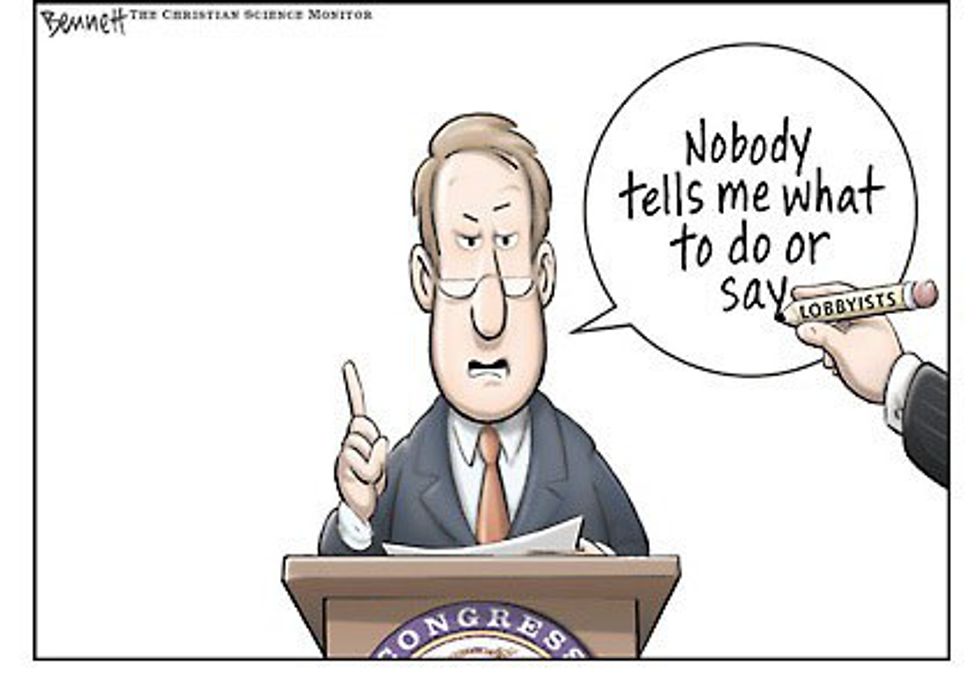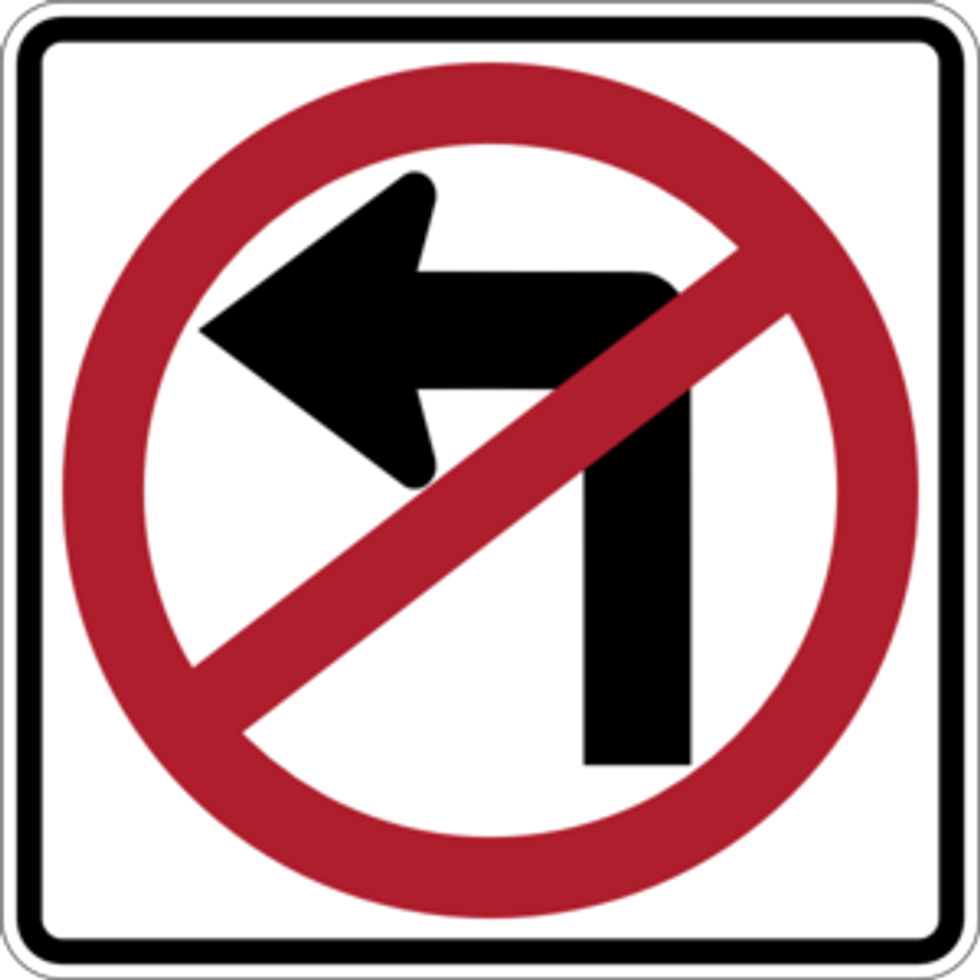Ron Swanson has an unsurprising cult following. Americans respect his conviction for rugged individualism, share his hatred for big government, and enjoy their breakfast bacon. Parks and Rec paints a nice caricature of contemporary American politics: Conservatives favor minimal government intervention claiming the market can regulate itself, while mainstream Democrats ally themselves with the government.
A conservative of the 1960s named George Wallace, well-known for his decree "Segregation now! Segregation tomorrow! Segregation for ever!" popularized the image of the square briefcase carrying bureaucrat, cackling with his head in the air, hair-blowing-in-the-wind while standing on top of a lustrous mound of our hard earned cash. Donald Trump has been called a modern day George Wallace (although Wallace appears to have had larger hands). The poor loved Wallace's anti-establishment message, and clearly, his populist rhetoric is as strong as ever.
�Corporate Bureaucrats, and those that serve their interests, quickly learned that harnessing hatred toward the government was highly profitable. However, anyone who is paying attention recognizes the market can't actually regulate itself without falling apart. For example, the government, in part, functions to threaten us with physical violence if we don't pay our debts to private entities. Anthropologist David Graeber amusingly observes "Whenever someone starts talking about the "free market" it's a good idea to look around for the man with the gun. He's never far away" in his book The Utopia of Rules: On Technology, Stupidity, and the Secret Joys of Bureaucracy.
The right wing has successfully created a scenario in which government regulation and the free market are antithetical to one another; the former viewed as a soul-sucking antagonist, the latter equated with personal liberty and freedom.� But what do public and private bureaucrats mean when they proclaim the market needs to be deregulated? Is re-regulating the market to serve their interests more accurate? Could Ron Swanson's dream come to fruition in a capitalist economy?
A hypothetical scenario with everyone's drunk Uncle Unfettered might help us answer these difficult questions.
Uncle Unfettered Lobbies In Favor of Regulation
Let's imagine your drunk Uncle from North Carolina starts selling your family's favorite home-brewed pint of magic. Turns out you don't have to be sober to run one hell of a business (also his massive trust fund allowing him to buy up local businesses didn't hurt) and before you know it Uncle Unfettered owns a third of the booze business in the state. He's got a problem, though. Those pesky small, local craft brewers are cutting into his profits. Bob wants to put them out of business and, since he's now the CEO of a large corporation, he can afford a lobbying group. The lobbyists put a million dollars into Representative Mr. Laissez Fair's campaign fund and suddenly there's legislation on the table that strengthens state laws against selling beer at breweries. Now all beer in North Carolina must be sold through retail or whole sale.
This scenario might seem a bit extreme, but it's actually a quite common phenomenon called rent-seeking which can be described as "individuals or organizations that have succeeded with existing business models and look to the government and regulators as their first line of defense against innovative competition." Rent seekers hire lobbyists and lawyers to manipulate the government to serve their interests. For example, the automobile industry has been fighting in favor of regulations that ban car manufacturers from selling products directly to consumers in order to keep Tesla at bay.
In this way politicians and corporations that publicly preach "free market" capitalism are writing regulations behind closed doors that benefit large business at the expense of the little guy.
Uncle Unfettered Lobbies Against the 'Bureaucratic Red Tape' in the name of the Free Market!
Uncle Bob has another problem. Government regulations dictate that his company must refrain from using isinglass, a cheap ingredient derived from fish bladder, to filter his beer. For the sake of this scenario, let's pretend isinglass is carcinogenic. Uncle Bob's corporation knows about this health risk but decides to fight the regulation with the rationalization that his profits will increase. His corporation uses his lobbying group to convince the government into keeping isinglass off its list of carcinogens by citing industry-funded studies that "prove" its safety, and donating some more money to campaigns and wah-lah the regulation is lifted.
Unfortunately, isinglass was WAY more carcinogenic than anyone expected. North Carolinians are starting to get cancer at an abnormally early age, putting many out of work. The government needs to employ more bureaucrats in order to ensure these sick people are getting the funds they need to survive. Now it's clear the beverage industry really can't regulate itself, so the government hires new employees to oversee their operations.
According to David Graeber, there's a paradox between government initiatives intended to promote market forces and the number of regulations and government employed bureaucrats, which he has coined the Iron Law of Liberalism:
"Any market reform, any government initiative intended to reduce red tape and promote market forces will have the ultimate effect of increasing the total amount of paperwork, and the total number of bureaucrats the government employs."
The profit-motive encourages abuse of the system. The abuses lead to more regulation.
America's Incest Problem
After years of communication and collaboration, Uncle Bob and a top official in the Alcohol and Tobacco Tax and Trade Bureau are chummy. The official knows that he might be rewarded for turning a blind eye to any illegal or harmful conduct. Surely enough, as soon as this top official decided isinglass should not be recognized as a carcinogen, he was offered a job as the President of the National Beer Wholesalers Association. It pays much better than the government job and offers luxurious travels in 5 star hotels.
The lines that separate government from corporation are exceedingly blurry. The revolving door has been spinning and spinning, and spinning some more for decades. One particularly frustrating example (of many): Michael R. Taylor worked at the FDA as Deputy Commissioner for Policy, left to become a lawyer for Monsanto ("The World's Most Evil Corporation"), and has been back at the FDA since 2010 as the Deputy Commission for Foods.
When people become frustrated with the government, with the IRS, and with men in suits, they only have the option of veering right. Unfortunately the masses are veering into a smoke screen argument designed primarily by the right and falling off a cliff to their own demise. If democrats want to appeal to the (rightfully angry) masses, they need to admit that they've become entrenched in America's incest problem, admit that their blood is far from pure.
Perhaps someday Ron's utopia will become closer to reality, but it looks like we need to re-think capitalism first.

















 Photo by
Photo by  Photo by
Photo by  Photo by
Photo by 










